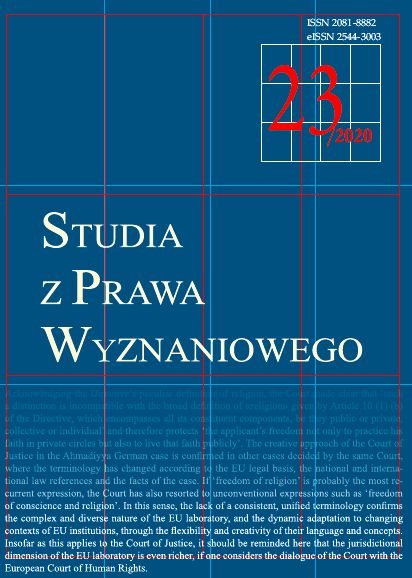Dokonywanie czynności procesowych przed sądem kościelnym jako okoliczność wyłączająca odpowiedzialność za naruszenie dóbr osobistych. Glosa do wyroku Sądu Apelacyjnego w Białymstoku z dnia 12 stycznia 2017 r., I ACa 676/16
Acting in litigation before an ecclesiastical court as a circumstance excluding the parties’ liability for the infringement of personality rights. Commentary to the judgment of the Court of Appeals in Białystok of 12 January 2017, I ACa 676/16
Author(s): Joanna Misztal-KoneckaSubject(s): Law, Constitution, Jurisprudence, Constitutional Law, Civil Law, Human Rights and Humanitarian Law, Canon Law / Church Law, Court case
Published by: Katolicki Uniwersytet Lubelski Jana Pawła II - Wydział Prawa, Prawa Kanonicznego i Administracji
Keywords: dobra osobiste; prawo kanoniczne; sąd kościelny; prawo państwowe; personality rights; canon law; civil law; ecclesiastical court;
Summary/Abstract: This commentary discusses the judgment entered by the Court of Appeals in Białystok, Poland, wherein the court held that the circumstance of acting in litigation before an ecclesiastical court excluded the parties’ liability for the infringement of personality rights. In the author’s opinion, the decision merits approval both as to the view concerning the admissibility of the judicial path before a state court in matters of the protection of personality rights violated before an ecclesiastical court and as to the claim that the protection of personality rights is not available in circumstances excluding the unlawfulness of such a violation. Acting before an ecclesiastical court, which operates with the approval of state legislation, fits within the group of cases in which one is acting within the boundaries of the legal order. The legal qualification of activities arising from a party’s procedural rights, whether acting before a state court or an ecclesiastical court, requires verifying whether such activities are based on the existing legal right of a subject to act, which means acting within the competence set out by the legal order, citing true facts (or justifiably regarded as true) in a moderate manner and to the extent necessary for the enforcement of the party’s right.
Journal: Studia z Prawa Wyznaniowego
- Issue Year: 2020
- Issue No: 23
- Page Range: 421-440
- Page Count: 20
- Language: Polish

